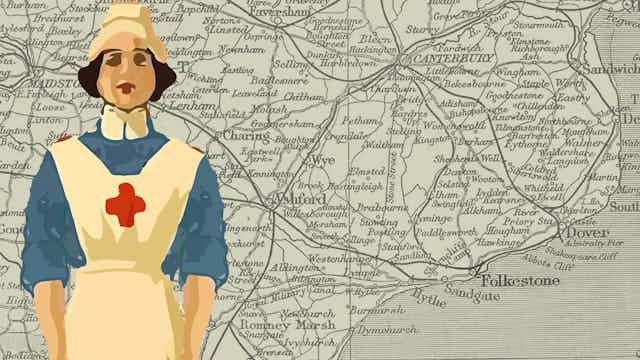When the debut of the BBC Radio Four World War I drama Home Front aired in August 2014, it was described as “the most ambitious radio drama project embarked on by the BBC for half a century”. Over four years and 600 episodes, Home Front brought to life the stories of individual lives during World War I, with each episode set exactly 100 years from the day of broadcast.
Home Front, which finished on the day before Remembrance Sunday, is a fictitious drama – but told against the factual background of World War I, drawing on a kaleidoscope of different perspectives, compelling storylines are melded around the events at the time.
This is a story, not about the war, but about how the country was changed by it. Based variously in the southern English seaside town of Folkestone, the north-eastern shipbuilding centre of Tynesmouth and Devon in England’s west country – it brings to life crucial changes in national consciousness. This includes how limitations on male-only jobs were swept aside by the desperate need for women to fill posts left vacant; the appetite for new forms of spiritualism to make contact with lost sons and husbands; and the sharp disenchantment with established values, as eager young recruits are returned damaged or dead.
There may no longer be any “Tommies” left alive – but there are still plenty of people who remember a parent or great grandparent who had been shaped by the war. For a younger generation, Home Front draws on shared memories to reclaim a sense of the personal and communal from the desolating image of the trenches.
This is also a pivotal time in how we mark shared events. As radio competes with on-demand digital platforms, Home Front feels like the chance to make an impact when there is still a shared listening audience in the UK at least.
A fine line to tread
The challenge is to turn fine intentions into good drama. Telling complex stories involving 65 characters into 12-minute episodes is a tall order. As consultant to the series, historian Maggie Andrews, notes: child-beating, chauvinism and anti-German vitriol were all present at the time, but portrayed too frequently and the audience may lose sympathy in the characters. Used well, however, and it can be a powerful source of drama. In one poignant scene, a vicar’s wife writes to her husband about the death of their infant child, the husband having left for France being unable to recognise their mixed-race child, as his own.

In order to address the vastness of the shared experience, while also keeping a sense of the personal, the production uses the clever trick of telling each episode from a different viewpoint. In individual episodes stories may seem domestic – but listen across seasons and you experience air-raids in Folkestone, industrial disputes in Tyneside, espionage in Belgium and coastal hospitals overwhelmed by the injured. Despite this, individuals are never lost in the epic sweep of the series.
‘Event listening’
The series has not been without its critics. Some bemoan a morbid fascination with the war, others observe a Radio Four tone of dialogue-heavy content, as opposed to the trend for confessional-style podcasts or strongly soundscaped action-dramas such as Stardust (Neil Gaiman and Dirk Maggs) or Home Front’s companion series Tommies.
But with an audience of up to three million per week it is among the the most listened-to radio dramas in the UK, behind The Archers. To put that in context, top US fiction podcasts have reached 100m downloads – but as a radio production and podcast, Home Front has achieved more than 300m listens.
There is also a passionate following on social media and a surprisingly international audience. In researching the series, I talked to audio drama producer Austin Beach from Kentucky, who admired the authenticity of the characters and settings, as well as a French listener who ran a petition to extend the series. There was also a German listener who praised the characterisation of Germans as being “as real as their British counterparts”, and observing “you might even like them.”
These successes notwithstanding, it’s an open question whether something like Home Front might be repeated in the future. When commissioned in 2013 Radio 4 was unequivocally the dominant story-telling medium in the UK, now it competes for market share with podcasters, publishers and the Amazon audiobook subsidiary, Audible. Will public service broadcasting continue to have the shared, unifying power of radio, in a world of on-demand multi-channel listening?
Public service broadcasting in a new era
Home Front is a remarkable series, full of subtle humour and some breathtakingly poignant moments. But more than this, it transports listeners to a world that lies on the cusp of memory and history. In this sense it is a triumph of the Reithian values: to inform, to educate and to entertain.

As BBC radio embarks on a new era, with the launch of the digital platform BBC Sounds designed to appeal to younger audiences, I hope that it continues to champion the public interest by backing big initiatives like Home Front. But I also believe it has a role in coordinating and nurturing talent.
In a recent project I was involved in, the 11th Hour Audio project, podcasters from all over the world collaborated to create new horror-themed productions for World Audio Drama Day. The BBC does not always need to commission content; competitions, sharing studio time or co-productions could be an alternative route to reaching new audiences in commemorating national events.
As the last bugle sounds on this epic production, BBC Radio should be congratulated on commissioning a risky but rewarding series. Many will miss it, some will not, but there is no denying the ambition which proves the value of public service broadcasting. And if you haven’t had the chance to listen, it will continue to be available for 10 years online.

